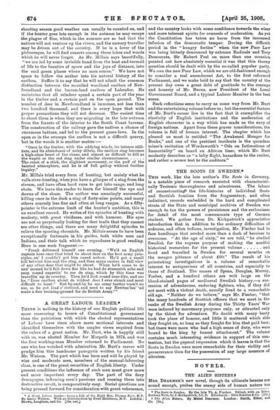A GREAT LABOUR LEADER.*
THERE is nothing in the history of our English political life more reassuring to lovers of Constitutional government than the patriotism with which the elected representatives of Labour have risen above mere sectional interests and identified themselves with the ampler views required from the rulers of a great nation. Mr. Burt, who is happily still with us, was elected Member for Morpeth in 1874, and was the first working-man Member returned to Parliament. No one who has watched with admiration Mr. Burt's career will grudge him this handsome panegyric written by his friend Mr. Watson. The part which has been and will be played by wise and moderate men, members of the manual-labouring class, is one of the great securities of English liberty. Under present conditions the influence of such men must grow more and more important every day. The part of the fiery demagogue, inflaming men's passions and rousing them into destructive revolt, is comparatively easy. Social questions are being pressed forward for consideration with great vehemence, * A Groot Labour Leader: being a Life of the Right Hon. Thomas Burt, M.P. By Aaron Watson. With an Introduction by Fred Maddison, M.P. London : Brown, Langhosn. and Co. [15s. net.)
and the country looks with some confidence towards the wiser and more tolerant spirits for counsels of moderation. As yet the Constitution has taken no harm from the increased infusion of the democratic temper. During the difficult period in the "hungry forties" when the new Poor Law was being bitterly denounced by extreme Radicals and Tory Democrats, Sir Robert Peel on more than one occasion pointed out how absolutely essential it was that this thorny question should be dealt with by the so-called popular party. We owe the new Poor Law, which we are old-fashioned enough to consider a real amendment Act, to the first reformed Parliament, and we make bold to say that the country at the present day owes a great debt of gratitude to the courage and honesty of Mr. Burns, now President of the Local Government Board, and a typical Labour Member in the best sense.
Such reflections seem to carry us some way from Mr. Burt and the entertaining volume before us; but the essential feature of Mr. Burt's career lies in the fact that it exemplifies the elasticity of English institutions and the moderation of English character in a way which has made us the envy of foreign nations. Apart from these graver considerations, the volume is full of human interest. The chapter which has pleased us most is entitled "The Awakened Hunger for Books," and one of the prettiest incidents is the quondam miner's recitation of Wordsworth's "Ode on Intimations of Immortality" on board an African liner, which Mr. Burt modestly describes as "a lofty flight, hazardous to the reciter, and rather a severe test to the auditors."






















































 Previous page
Previous page